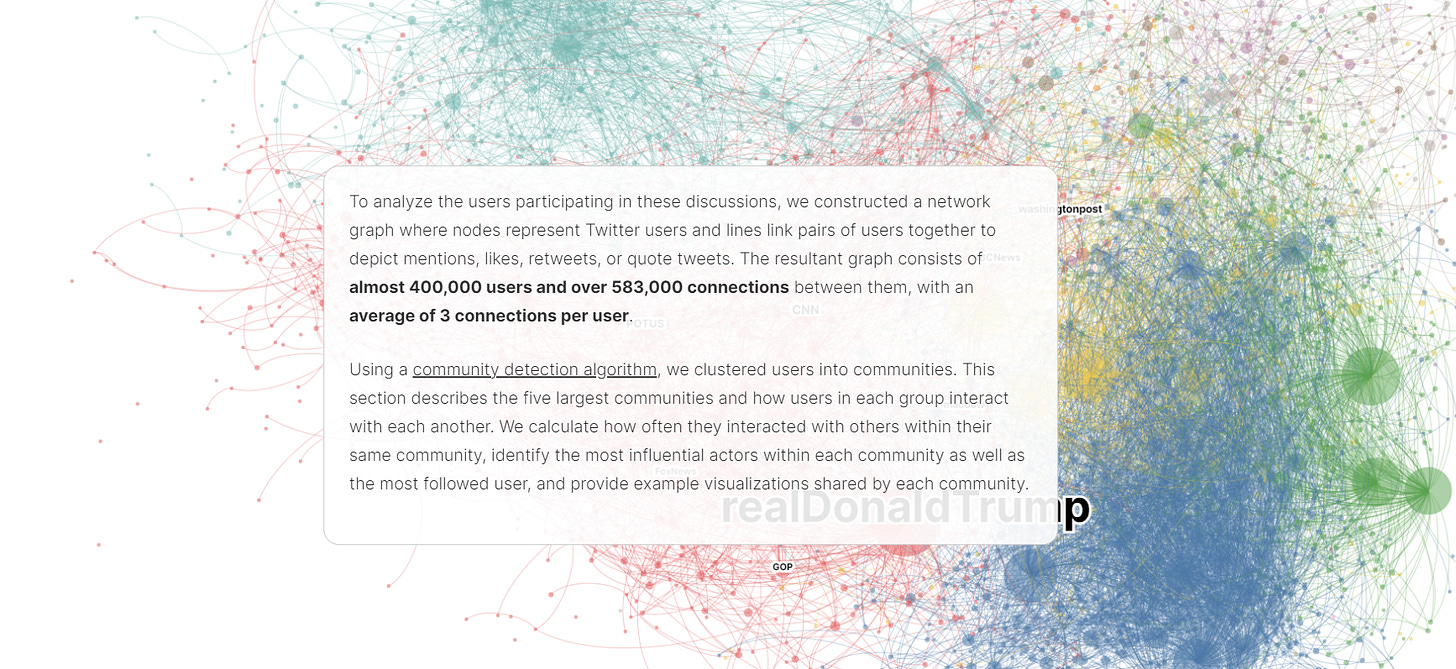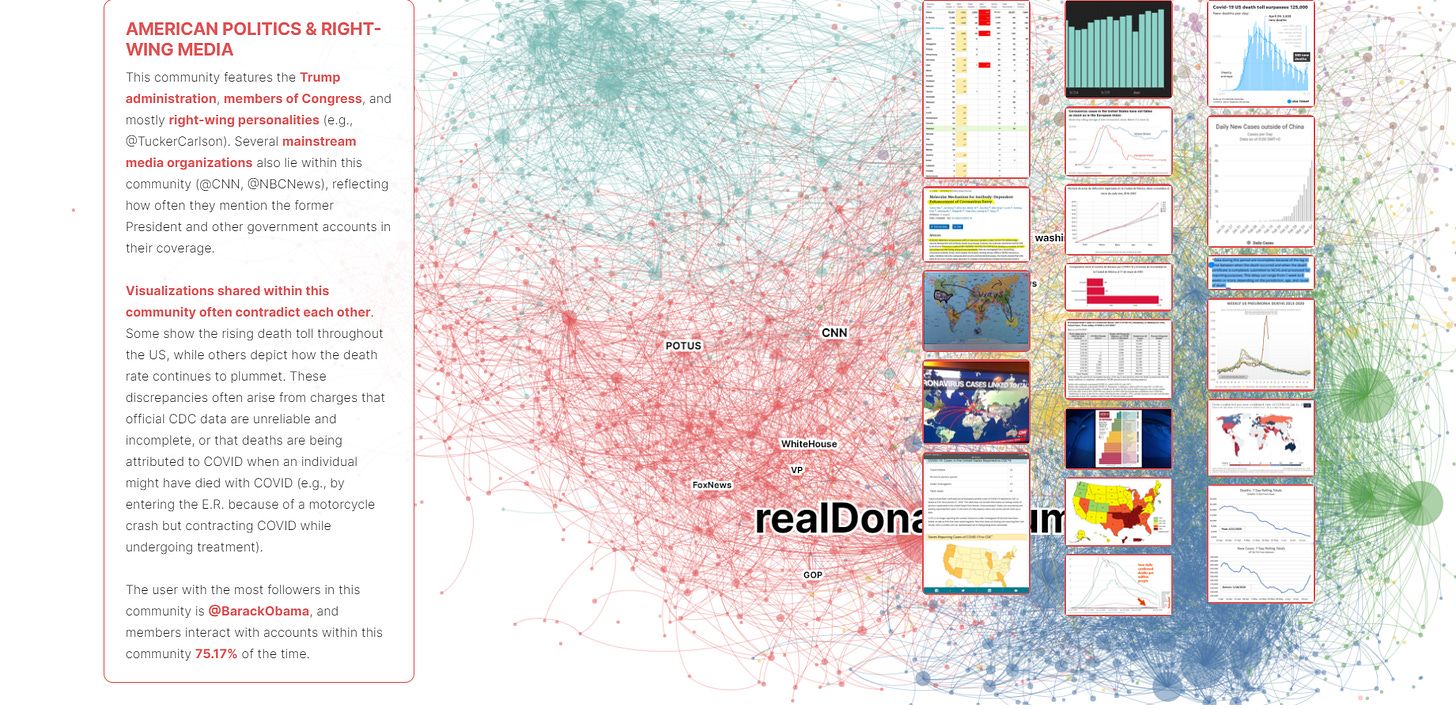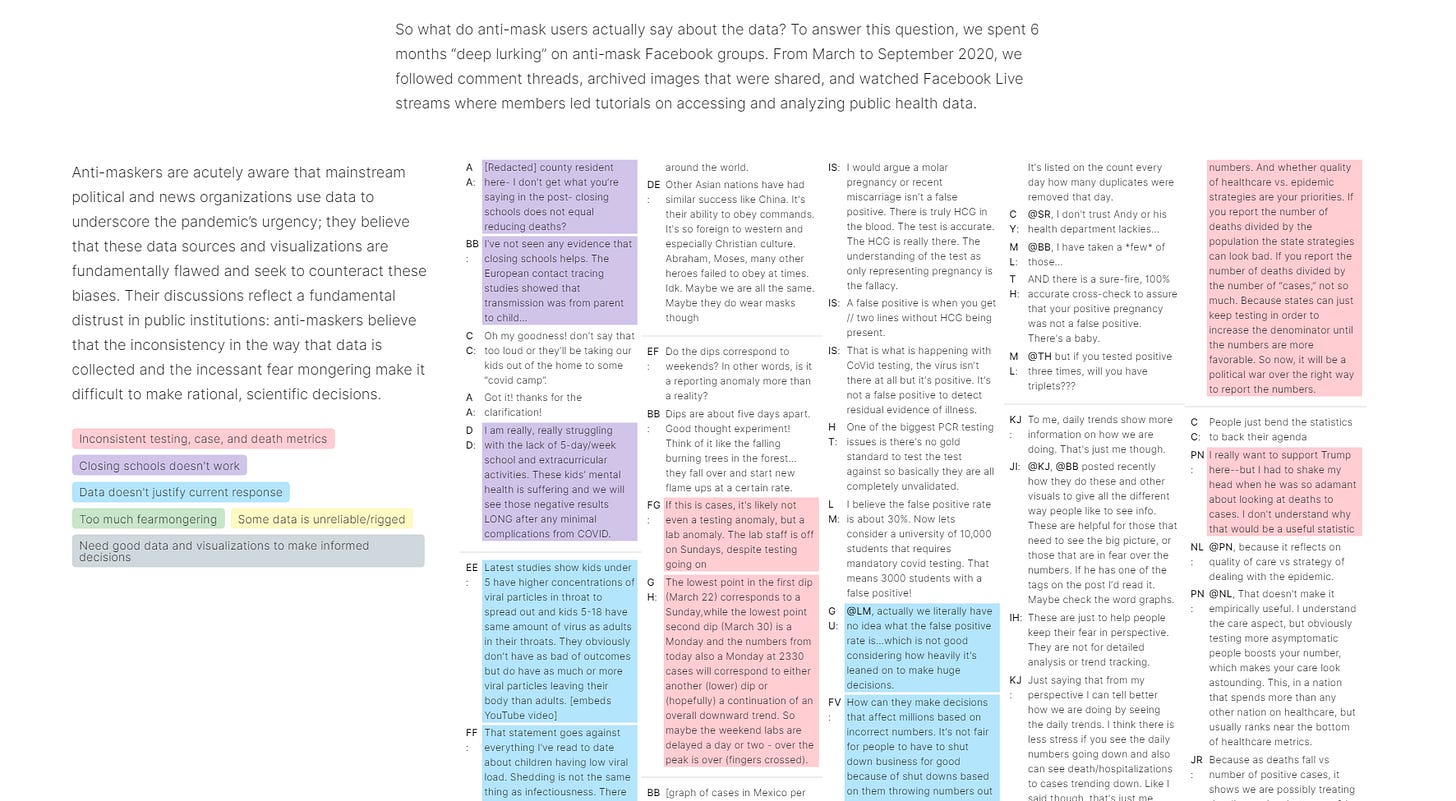MIT Study: Anti-Maskers "Grounded In a More Scientific Rigor"
Morgan Lesko reviews a recent study that found anti-mask communities online were grounded in data + science and reviews the 'pro-mask' studies cited by it.
A team from MIT organized a compelling study of online research communities. Some of the research communities they studied Morgan Lesko says are adjacent to independent research and media communities and how they operate. Lesko also performs a review of the ‘pro-mask’ studies cited by the team at MIT. The study appears to corroborate many of the claims made in the alternative media space over the past year.
The MIT team put together an interactive website that goes with the study on viral visualizations. Here is the abstract from that study1:
Controversial understandings of the coronavirus pandemic have turned data visualizations into a battleground. Defying public health officials, coronavirus skeptics on US social media spent much of 2020 creating data visualizations showing that the government's pandemic response was excessive and that the crisis was over. This paper investigates how pandemic visualizations circulated on social media, and shows that people who mistrust the scientific establishment often deploy the same rhetorics of data-driven decision-making used by experts, but to advocate for radical policy changes. Using a quantitative analysis of how visualizations spread on Twitter and an ethnographic approach to analyzing conversations about COVID data on Facebook, we document an epistemological gap that leads pro- and anti-mask groups to draw drastically different inferences from similar data. Ultimately, we argue that the deployment of COVID data visualizations reflect a deeper sociopolitical rift regarding the place of science in public life.
The study2 is around 18 page long and it is fascinating in its approach to reviewing alternative research communities.
The above graphic is used by the study and shows how the anti-mask communities are grounded in more scientific rigor, not less. The study is a “best paper” nominee.
The full 18 page study3 can be read here. The interactive website4 that accompanies the study can be viewed here. It has a data dashboard that is very interesting. Here are some of the graphics from the dashboard:
Obviously the study has a liberal bias, yet they are still forced to make concessions about anti-mask groups.
For instance, anti-mask users argue that there is an outsized emphasis on deaths versus cases: if the current datasets are fundamentally subjective and prone to manipulation (e.g., increased levels of faulty testing), then deaths are the only reliable markers of the pandemic’s severity. Even then, these groups believe that deaths are an additionally problematic category because doctors are using a COVID diagnosis as the main cause of death (i.e., people who die because of COVID) when in reality there are other factors at play (i.e., dying with but not because of COVID). Since these categories are subject to human interpretation, especially by those who have a vested interest in reporting as many COVID deaths as possible, these numbers are vastly over-reported, unreliable, and no more significant than the flu.
This is a quote from the data dashboard, discussing why some people are skeptical about Covid-19 reporting.
Most fundamentally, anti-mask groups mistrust the scientific establishment because they believe that science has been corrupted by profit motives and by progressive politics hellbent on increasing social control. Tobacco companies, they rightly argue, historically funded science that misled the public about whether or not smoking caused cancer. Pharmaceutical companies are therefore in a similar boat: companies like Moderna and Pfizer stand to profit billions from the vaccine, so it is in their interest to inflate the pandemic’s death toll as much as possible. Knowledge from the CDC, academia, or pharmaceutical companies therefore needs to be subject to more rigorous scrutiny and not accepted as consensus. Arguing that anti-maskers simply need more scientific literacy is to characterize their approach as inexplicably extreme, and these users interpret these calls as further evidence of the “Radical Left’s” impulse to condescend to citizens who actually espouse common sense.
This is another quote where the researchers have to concede that big business has in the past paid “scientists”, “doctors” and the “media” for favorable reporting, for example big tobacco. I would also argue that universities, doctors and the media were employed by the government when they irradiated unwitting citizens in the past. They did these experiments on US soldiers, some of whom died as a result or had horrible illness:
The San Francisco Chronicle reports that a recently published book by Lisa Martino-Taylor, an associate professor of sociology at St. Louis Community College, reveals the experiments the US government conducted to determine the dangers of radioactivity on its own populace.
In her newest book, Behind the Fog: How the U.S. Cold War Radiological Weapons Program Exposed Innocent Americans, Martino-Taylor details how unsuspecting American citizens were fed, sprayed, or injected with radioactive materials during a series of experiments from the 1940s to the late 1960s.
Using previously unreleased documents, including Army records, that she obtained through the Freedom of Information Act, Martino-Taylor discovered that throughout these decades, researchers worked to develop radiological and “combination weapons,” weapons using radioactive materials along with chemical or biological weapons, by testing them on unknowing Americans.
This is an excerpt from an article in 20175 about newly obtained documents showing that in the past the US government had no problem experimenting on its own people without their consent.
The Alliance for Human Research Protection has documented6 decades of this activity and numerous experiments undertaken by the government:
Introduction: Tuskegee was thought to be an aberration; but the extensive scope of 4,000 radiation experiments — conducted on an estimated 20,000 unwitting victims, including military personnel, prisoners, federal workers, hospital patients, pregnant women and thousands of infants and disabled children — most of them poor and powerless. These nefarious experiments confirm the moral failure of American medicine and that medical researchers working with the government cannot be trusted.
Reports about secret radiation experiments appeared in the scientific literature as early as 1948, but none were concerned with the serious consequences for the human subjects. Few (if any) Americans had any idea about the nature or risks involved in radiation experiments initiated by their government until 1993 when investigative reporter, Eileen Welsome, wrote a Pulitzer Prize winning series of articles in the Albuquerque Tribune in which she described the nature and devastating effects of Plutonium injected into 18 hospitalized patients who were unwitting subjects: “the unspeakable scientific trials reduced thousands of men, women, and even children to nameless specimens.”
The government even used disables children for what they call “nefarious experiments” and claimed there was a moral failure of American medicine and medical researchers.
The above image is from a website that has gathered resources7 on drug and mind control experiments by the U.S. Government.
Democracy Now claims8 as recently as 2003-2005 the CIA was doing human experimentation at black sites and in places like Guantanamo Bay:
A new report from Physicians for Human Rights accuses the Bush administration of conducting illegal and unethical human experimentation and research on prisoners in CIA custody. The report details how doctors, psychologists and other professionals monitored the effects of sleep deprivation, waterboarding and other so-called “enhanced interrogation” techniques on more than a dozen prisoners. It charges that CIA doctors and other medical personnel turned the prisoners into research subjects and collected data in order to study and refine those techniques, but did so under the guise of trying to protect the health of the detainees.
This is the reason I believe that anti-mask remain skeptical of claims from the government, government agencies and the scientific establishment. Wikipedia has a page9 with other resources on this, so it is well known and documented.
Here is another quote from the data dashboard:
Convincing anti-maskers to support public health measures in the age of COVID-19 will require more than “better” visualizations, data literacy campaigns, or increased public access to data. Rather, it requires a sustained engagement with the social world of visualizations and the people who make or interpret them. While academic science is traditionally a system for producing knowledge within a laboratory, validating it through peer review, and sharing results within subsidiary communities, anti-maskers reject this hierarchical social model, as they espouse a vision of science that is radically egalitarian and individualist.
They admit that anti-maskers are not uneducated and stupid, they do not just need “data literacy” elsewhere in the study they concede that anti-maskers are highly data literate.
Morgan Lesko on the MIT Study
Lesko has published several videos about this study which I will include at the end of the article. He has also gone through the study and added his own commentary and clarifications10 that I find really helpful. Morgan writes:
A team from MIT put together a fascinating study on online research communities. I loved reading it and wanted to share with others to help them try to understand my world. Some of the research communities they studied sounded adjacent to independent research and media communities that I have participated in since before the 2009 Swine Flu Pandemic. This study also provides some fascinating lenses on my work in progress at buckystats.org.
As a software engineer who wants collective decisions to be more evidence-based, especially wherever informed consent is likely to be violated, this study was very fun to read. I only have a B.S. from the University of Maryland in 2005 for Computer Science with a concentration in Mathematics, through the Science, Technology, & Society Scholars program. I’ve been a public health activist since age nine with my first decade focused on big tobacco’s targeting of children. My second decade focused on ending the devastating war on drugs, where public health issues continue to be unjustly treated as criminal issues.
I do not claim this is a rigorous scientific inquiry, but rather, a rigorous dive into the resources and rhetoric cited in the 2021 MIT study first brought to my attention by The Last American Vagabond. Thanks you for all your work, Ryan!
This article began as a subjective reaction to the MIT study, written to share with others to help them understand. But as I began digging into the literature cited, it grew into a more objective review on the sub-topic of evidence for the efficacy of universal mask mandates.
He then proceeds to go through the study and add insightful commentary, while pulling in other sources to help clarify his commentary and provide additional data and information.
Here is Morgan’s video analyzing the study and adding his own commentary which I think is far more enlightening than the study itself. Morgan concludes:
It seems that many people currently support technocracy, consciously or not. Especially this past year, attendees of most science churches have believed many claims without even verifying that those claims are actually published in the publicly available holy texts.
But I do not consent to any further reduction of representation in governance. For decades, I’ve been working to reclaim more representation for we the people. Stronger evidence-based collective decision-making is a great goal. To do so while increasing representation requires catching people up on any relevant scientific topics as they become important. Most humans handle incredibly complex concepts every day. By default, the population must also be treated like rational adults, and we should constantly strive to elevate the national discussion to that of critical thinkers savvy with both data and systems (the work of their government).
If our chronically sick societies want to continue merging medical science with government and politics, then I believe these social experiments would be more ethical on far smaller scales than billions of people. Perhaps next time we run mass experiments with medical interventions, we could find ways to enable communities to ethically opt-in to collect strong data to finally support novel public health policies. Perhaps emergency measures could be voluntarily agreed to before states of emergency are declared. “What do our government prenuptial agreements say about this scenario?”
This concludes my reactions and commentary on the 2021 MIT study. Next, we will discuss my updated conclusions after my rigorous search…
Lesko then delves into citations and analysis of each one. I highly recommend going through his entire publication and reading his thoughts on the source and the data.
Viral Visualizations: How Coronavirus Skeptics Use Orthodox Data Practices to Promote Unorthodox Science Online, Crystal Lee, Tanya Yang, Gabrielle Inchoco, Graham M. Jones, Arvind Satyanarayan, ACM Human Factors in Computing Systems (CHI), 2021.
http://vis.mit.edu/pubs/viral-visualizations
http://vis.mit.edu/pubs/viral-visualizations.pdf
http://vis.mit.edu/covid-story/
https://allthatsinteresting.com/us-government-radiation
https://ahrp.org/category/scientific-racism/us-radiation-experiments-atomic-energy-commission/
https://web.archive.org/web/20120219232607/http://facstaff.gpc.edu/~shale/humanities/composition/assignments/experiment/lsd.html
https://www.democracynow.org/2010/6/8/experiments_in_torture_medical_group_accuses
https://en.wikipedia.org/wiki/Unethical_human_experimentation_in_the_United_States
https://wikiworldorder.org/2021/05/20/mit-study-anti-maskers-more-scientific-rigor-not-less/











